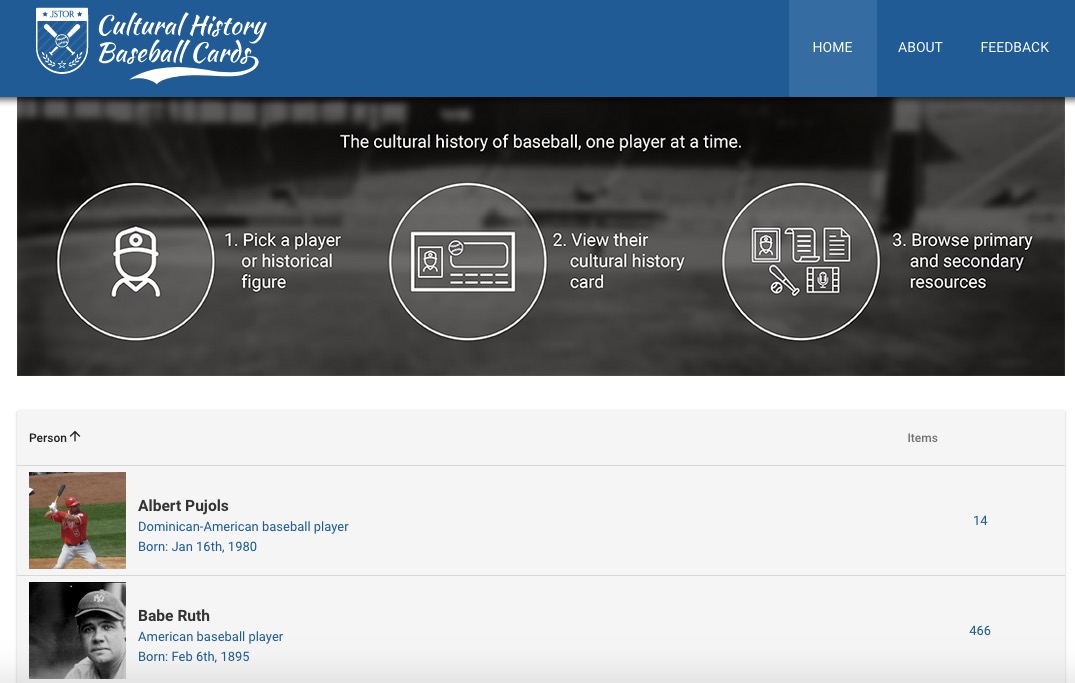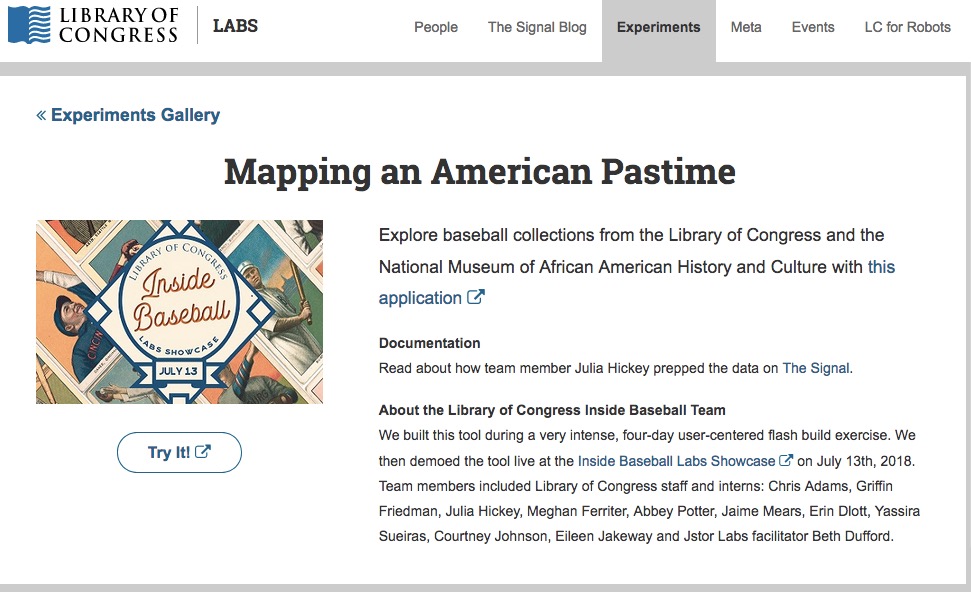Two New Digital Resources: JSTOR Labs and Library of Congress Labs Introduce “Cultural History Baseball Cards” and “Mapping America’s Past Time”
From JSTOR Labs/JSTOR and Library of Congress Labs:
Baseball has been a mainstay of American culture since the 1800s. Not only do millions watch games, myriad fans pore through player statistics, collect baseball cards, and immerse themselves in the game. And then there are those who make baseball their life’s work, delving into the sport’s history and its cultural and socio-economic impacts. Baseball historians do their work by heading into print and digital archives and sifting through materials, hoping to discover stories that have not yet been told or, in a culture rife with myths, looking for new insight and even truth.
This week, we get a glimpse into how the work of these historians might be changing with the help of technology and some creativity.
Both applications are in pilot stage, the results of a week-long flash build hosted at the Library of Congress to spur innovation and find new ways to use and connect the growing number of digital collections available to researchers. The event, dubbed “Inside Baseball,” incorporated collections from the Library of Congress, JSTOR, the National Museum of African American History and Culture (NMAAHC), and Wikipedia.
The Resources
JSTOR Labs and Library of Congress Labs (LC Labs) released two new online applications, Cultural History Baseball Cards and Mapping America’s Pastime.
[Clip]
Cultural History Baseball Cards, produced by JSTOR Labs, uses the metaphor of the baseball card, but replaces the batting and pitching statistics with data regarding the number of scholarly articles, primary source images, multimedia files, and memorabilia related to the player. Jackie Robinson’s card, for example, lists 486 scholarly articles from JSTOR, sixty-one images from the Library of Congress, NMAAHC and Wikimedia, and nine other multimedia files, printed primary sources and records of physical objects. Researchers can follow links to these resources, browsing through all the material from each collection related to the player.
There’s also another twist: cards are not just for players, but for managers, executives, and other people involved in America’s favorite pastime — together, these cards tell the story of baseball in America. LC Labs took the challenge in another direction, creating a website that maps documents and other materials from the collections to relevant geographic locations across the United States and overlaying data from other sources like team and stadium locations.
“We were thrilled to collaborate with the LC Labs team and to flash build alongside them,” said Alex Humphrey’s, JSTOR Labs’ Director. “As a die-hard baseball fan and history buff myself, I’m excited by the additional learning opportunities enabled by Cultural History Baseball Cards and Mapping America’s Pastime. I’m also hopeful that the work showcases an engaging and useful way to use linked open data to connect diverse collections that will inspire others to undertake similar creative approaches in other fields.”
Talking about the one-week build process, which was a new approach introduced to the LC Lab’s team by JSTOR, LC Labs Senior Innovation Specialist Abigail Potter added: “It was great to jump right in and start sketching out ideas on paper. Getting user feedback almost immediately was at first intimidating but it really helped us focus on what would be useful to people who would actually use the tool we were building. We learned so much by setting out this dedicated time to problem solve and try new approaches. We’re looking forward to testing the process with an internal team next.”
While Cultural History Baseball Cards and Mapping America’s Pastime create new prototype resources for serious and casual researchers, they also demonstrate the power of our library and museum archival collections. Once digital, they can be mined, utilized, brought together, and reimagined through linked open data.
“It’s amazing to see once-analog collections combined and transformed in ways that bring new perspective for researchers and the public,” said Humphreys. “With these experiments, we’re just beginning to harness the potential.”
Related Resources From JSTOR Labs/LC Labs Event at Library of Congress
Video Recording: JSTOR Labs and Library of Congress “Inside Baseball: Baseball Collections as Data” Showcase Event (July 13, 2018)
More From JSTOR Labs
See Also: Digital Humanities: Blurring Shakespeare with Help from JSTOR Labs (To Quote or Not to Quote
See Also: Cool Tools! Text Analyzer From JSTOR Labs Can Now Handle Content in 14 Languages!
More from LC Labs
Access/Learn About 10 More Experimental Resources/Projects
Filed under: Archives and Special Collections, Data Files, Digital Collections, Interactive Tools, Journal Articles, Libraries, Maps, News, Video Recordings
About Gary Price
Gary Price (gprice@gmail.com) is a librarian, writer, consultant, and frequent conference speaker based in the Washington D.C. metro area. He earned his MLIS degree from Wayne State University in Detroit. Price has won several awards including the SLA Innovations in Technology Award and Alumnus of the Year from the Wayne St. University Library and Information Science Program. From 2006-2009 he was Director of Online Information Services at Ask.com.




